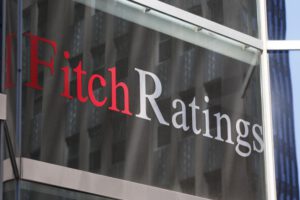 Global evaluation agency Fitch Ratings promoted its expectation on Turkey’s foreign currency on Thursday, describing that the country is making “firm progress” in assuring a soft landing for an overheated economy and constricting the current account deficit (CAD).
Global evaluation agency Fitch Ratings promoted its expectation on Turkey’s foreign currency on Thursday, describing that the country is making “firm progress” in assuring a soft landing for an overheated economy and constricting the current account deficit (CAD).
The ratings agency updated the position of the economy from “static” to “confident” in its report, bumping up its credit rating from BBB- to BB+, just a step below investment grade. In the meantime, the lira ascertained a drop to a new one-month low, although two-year Turkish bond yields arose and stocks fell for a fifth consecutive day.
Fitch’s upgrade will be welcome in Ankara, where a downgrade by S&P of the country’s BB sovereign credit rating from positive to static led an irate Prime Minister Recep Tayyip Erdoğan to advise that the country might set up a credit agency of its own. S&P told the downgrade in creditworthiness was due to Turkey’s high debt and aggravating terms of trade, which it anticipated would weaken as demand in Europe slowed.
The continuing impulse of exports in recent months, all the same, saw Moody’s bump Turkey’s bond in late June. Moody’s awarded the country a rating one notch below investment grade and gave a positive outlook for the country, indicating that a additional upgrade is probably in the mid-term.
The Thursday upgrade came as Fitch marked in a affirmation to the press a so far successful soft landing for the Turkish economy and “further progress in navigating a path back towards its potentiality growth rate.” The agency’s affirmation cited inflation falling at its target rate and the CAD narrowing to a more sustainable level.
The Fitch appraisal concluded that the Turkish economy overheated in 2011, and marked a CAD rate which arrive at 10 percent of gross domestic product (GDP) in 2011. Year-end inflation also hit double digits, “leaving it with a challenge of rebalancing, and vulnerable to a sharp correction.”
















 Afrikaans
Afrikaans Shqip
Shqip አማርኛ
አማርኛ العربية
العربية Հայերեն
Հայերեն Azərbaycan dili
Azərbaycan dili Euskara
Euskara Беларуская мова
Беларуская мова বাংলা
বাংলা Bosanski
Bosanski Български
Български Català
Català Cebuano
Cebuano Chichewa
Chichewa 简体中文
简体中文 繁體中文
繁體中文 Corsu
Corsu Hrvatski
Hrvatski Čeština
Čeština Dansk
Dansk Nederlands
Nederlands English
English Esperanto
Esperanto Eesti
Eesti Filipino
Filipino Suomi
Suomi Français
Français Frysk
Frysk Galego
Galego ქართული
ქართული Deutsch
Deutsch Ελληνικά
Ελληνικά ગુજરાતી
ગુજરાતી Kreyol ayisyen
Kreyol ayisyen Harshen Hausa
Harshen Hausa Ōlelo Hawaiʻi
Ōlelo Hawaiʻi עִבְרִית
עִבְרִית हिन्दी
हिन्दी Hmong
Hmong Magyar
Magyar Íslenska
Íslenska Igbo
Igbo Bahasa Indonesia
Bahasa Indonesia Gaeilge
Gaeilge Italiano
Italiano 日本語
日本語 Basa Jawa
Basa Jawa ಕನ್ನಡ
ಕನ್ನಡ Қазақ тілі
Қазақ тілі ភាសាខ្មែរ
ភាសាខ្មែរ 한국어
한국어 كوردی
كوردی Кыргызча
Кыргызча ພາສາລາວ
ພາສາລາວ Latin
Latin Latviešu valoda
Latviešu valoda Lietuvių kalba
Lietuvių kalba Lëtzebuergesch
Lëtzebuergesch Македонски јазик
Македонски јазик Malagasy
Malagasy Bahasa Melayu
Bahasa Melayu മലയാളം
മലയാളം Maltese
Maltese Te Reo Māori
Te Reo Māori मराठी
मराठी Монгол
Монгол ဗမာစာ
ဗမာစာ नेपाली
नेपाली Norsk bokmål
Norsk bokmål پښتو
پښتو فارسی
فارسی Polski
Polski Português
Português ਪੰਜਾਬੀ
ਪੰਜਾਬੀ Română
Română Русский
Русский Samoan
Samoan Gàidhlig
Gàidhlig Српски језик
Српски језик Sesotho
Sesotho Shona
Shona سنڌي
سنڌي සිංහල
සිංහල Slovenčina
Slovenčina Slovenščina
Slovenščina Afsoomaali
Afsoomaali Español
Español Basa Sunda
Basa Sunda Kiswahili
Kiswahili Svenska
Svenska Тоҷикӣ
Тоҷикӣ தமிழ்
தமிழ் తెలుగు
తెలుగు ไทย
ไทย Українська
Українська اردو
اردو O‘zbekcha
O‘zbekcha Tiếng Việt
Tiếng Việt Cymraeg
Cymraeg isiXhosa
isiXhosa יידיש
יידיש Yorùbá
Yorùbá Zulu
Zulu